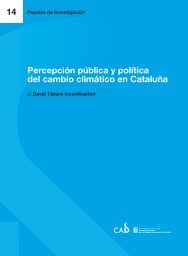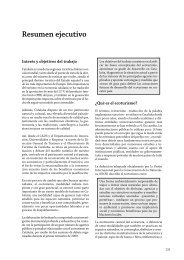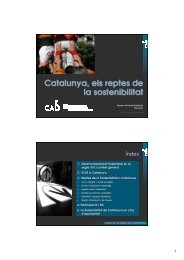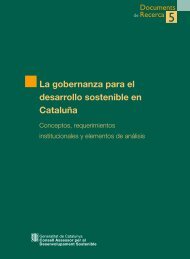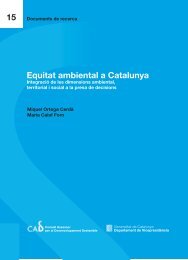Estratègies per al desenvolupament sostenible - Generalitat de ...
Estratègies per al desenvolupament sostenible - Generalitat de ...
Estratègies per al desenvolupament sostenible - Generalitat de ...
You also want an ePaper? Increase the reach of your titles
YUMPU automatically turns print PDFs into web optimized ePapers that Google loves.
A change from formulating and implementing a fixed plan that will inevitably becomeobsolete, to producing an o<strong>per</strong>ative, adaptive and constantly-improving system.A change from the i<strong>de</strong>a that governments are solely responsible for <strong>de</strong>velopmentto the i<strong>de</strong>a that responsibility lies with society and <strong>al</strong>l its components, without<strong>de</strong>triment to the specific responsibilities of governments.A change from controlled and centr<strong>al</strong>ised <strong>de</strong>cision-making systems towards thesharing of results and opportunities, open negotiations, co-o<strong>per</strong>ation and concertedaction.A change from a solely product-based focus (plans, rules and projects, etc.) to afocus on results and the qu<strong>al</strong>ity of participation and management processes.A change from sector<strong>al</strong> planning to integrated planning.In the last ten years, the notion of what a strategy for sustainable <strong>de</strong>velopment shouldbe has changed appreciably. Today, strategy is no longer confused with a documentthat contains a new, unique executive plan. In fact we know there are documentswithout strategy and strategies without documents. According to the OECD, todaythere is a ten<strong>de</strong>ncy to see strategies as a series of co-ordinated processes andmechanisms which, consi<strong>de</strong>red as a whole, provi<strong>de</strong> a participatory system for theimplementation of outlooks, go<strong>al</strong>s and objectives, in or<strong>de</strong>r to <strong>de</strong>ci<strong>de</strong> upon actionand to co-ordinate implementation and review thereof. A strategy is not an initiativeto be un<strong>de</strong>rtaken on a single occasion, but one that requires an ongoing participatoryprocess that inclu<strong>de</strong>s <strong>per</strong>manent learning mechanisms 3 .Principles that may inspire the production and <strong>de</strong>ployment of sustainable <strong>de</strong>velopmentstrategies have now been formulated. The following (in no or<strong>de</strong>r of prece<strong>de</strong>nce)should be consi<strong>de</strong>red:1. Clear focus on people’s wellbeing, including future generations.2. A long-term consensus-based outlook, including ways of <strong>de</strong><strong>al</strong>ing with needsand changes in the short and medium term.1323 See Carley, M. and Christie, I. “The World’s Commons: The Ch<strong>al</strong>lenge of Governance”, a Governancefor Sustainable Development. London: World Humanity Action Plan, 2000.





